

EDI Annual Report 2024
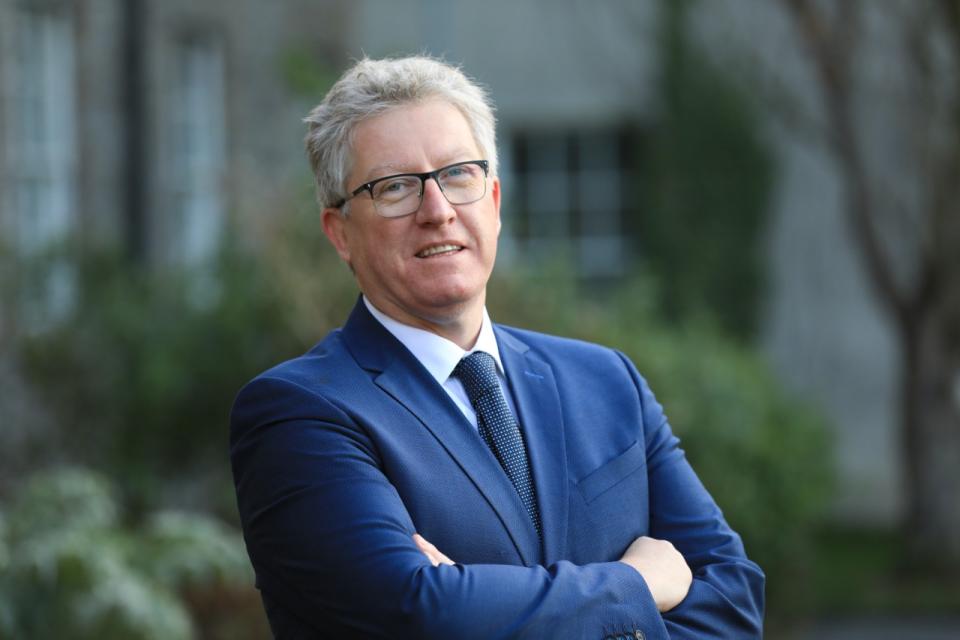
Professor Dáire Keogh, DCU President
Introduction by Professor Dáire Keogh, President of DCU
In the busy life of a University, we tend to always look forward, scanning the horizon for challenges and opportunities. Annual reports like this are invaluable, as they allow us to pause and take a look in the rearview mirror. They show us the progress made and the distance covered.
Looking back over the past year, the University community can proudly reflect on the achievement of several significant EDI milestones. 2024 was the year that DCU attained the Athena Swan Silver Award, a prestigious recognition of our action on gender equality and cultural transformation. Meanwhile, our third Gender Pay Gap report revealed meaningful improvements in gender balance across the University. The launch of an ambitious five-year Gender Equality and Intersectionality Action Plan also demonstrated our determination to maintain our forward momentum.
Race equality was another focus area in 2024. Building on our adoption of the Higher Education Authority (HEA) Anti-Racism Principles, DCU established the Race Equality Working Group, tasked with developing a comprehensive institutional Race Equality Action Plan. Meanwhile, our vibrant Black History Month programme gave us an opportunity to celebrate the diversity of our University community.
During the summer, DCU’s first official representation at the Dublin Pride Parade was another cause for celebration. Within the University, we launched Pride+, DCU’s LGBTQIA+ network. This group brings together staff and allies to celebrate diversity and inclusion through a programme of cultural, information and training events.
Overall, I was pleased to see the continued strong engagement of DCU staff with workshops and training offered by the EDI team during the year. Over 500 people attended a range of sessions covering topics such as trans, intercultural and autism awareness. This work plays a critical role in fostering and maintaining a culture that reflects DCU’s values.
I want to thank everyone, both staff and students, who have contributed to building our inclusive community. We can be proud that we are moving in the right direction.

Gareth Yore, Vice-President for People, Equality, Diversity and Inclusion
Message from Gareth Yore, Vice-President for People, Diversity, Equality and Inclusion
I was very proud to move from my role of Director of Human Resources to that of VP for People, Diversity, Equality and Inclusion in 2024. In undertaking this role I feel a profound sense of responsibility in continuing the great work previously undertaken by Professor Anne Sinnott, Deputy President.
In today’s world, the promotion and protection of the EDI agenda is more crucial than ever and through its actions the DCU Community continues to demonstrate strong leadership in this area.
Our DCU Community has always valued, equality, diversity and inclusion - long before EDI was a recognised organisational function. Our actions on this matter speak louder than words as we explicitly have called out Inclusivity as a value in our organisational strategy -Transformation for an Unscripted Future. In DCU People we are driven by this value as our key objective is to ensure that Our DCU Community is one in which all colleagues can Emerge, Thrive and Lead. This means that everyone has a voice which is valued.
Finally, I am very proud of what we have achieved in 2024 which is detailed further in this report. This would not have been possible without the hard work, commitment and dedication of our EDI team and most importantly all of you as members of our DCU Community. I have no doubt that if we continue to uphold our values, we will further enhance the inclusive nature of our DCU Community irrespective of external challenges and I look forward to continuing this journey with you.
DCU is a ‘People First’ university and is deeply committed to embedding the values of equality, diversity and inclusion (EDI). With ‘Inclusivity’ included as a core value in DCU’s 2023 - 2028 strategy - Transformation For An Unscripted Future, we are committing to fostering a culture that is diverse, open and inclusive, where all perspectives, backgrounds and experiences are valued, and EDI a lived experience for all.
The attainment of the University’s Athena Swan Silver Award, the launch of an ambitious gender equality and intersectionality five year action plan, and the signing of the Anti-Racism Principles represents another significant step in continuing to embed the principles of equality, diversity and inclusion into our university.
The following report highlights and celebrates many of the various ways that the values of equality, diversity and inclusion are embedded in the work of teams across DCU. The full extent of DCU staff’s dedication to EDI is not possible to capture in one report, but we hope this snapshot serves to demonstrate the positive journey that DCU is on.

Mr Seamus Walshe (Chair)
When I reflect on 2024 I do so with enormous pride in the demonstrable progress DCU has made in relation to equality, diversity and inclusion.
On behalf of the EDI sub-committee I wanted to thank all the DCU team who work all year round on Athena Swan, Gender Pay Gap report, the Public Sector Equality and Human Rights Duty as well as the plethora of activities that drive awareness and education amongst all DCU Staff of the importance of making the University a safe and welcoming place for everyone. The objective external assessments by which progress on EDI can be measured in DCU have, without exception, proven we are moving in the right direction whether that be the decrease in the Gender Pay Gap or the attainment of the Silver Athena Swan accreditation to name but two.
During the year we also addressed our gender imbalance as a sub committee with the addition of Jen O’Hara, Lisa Darcy and Dr Audrey Bryan. I wanted to thank the entire sub committee and to our regular DCU content presenters Joanne Mulligan, Swagata Sharma and Jenny Lawlor. I look forward to another year of progression in 2025.
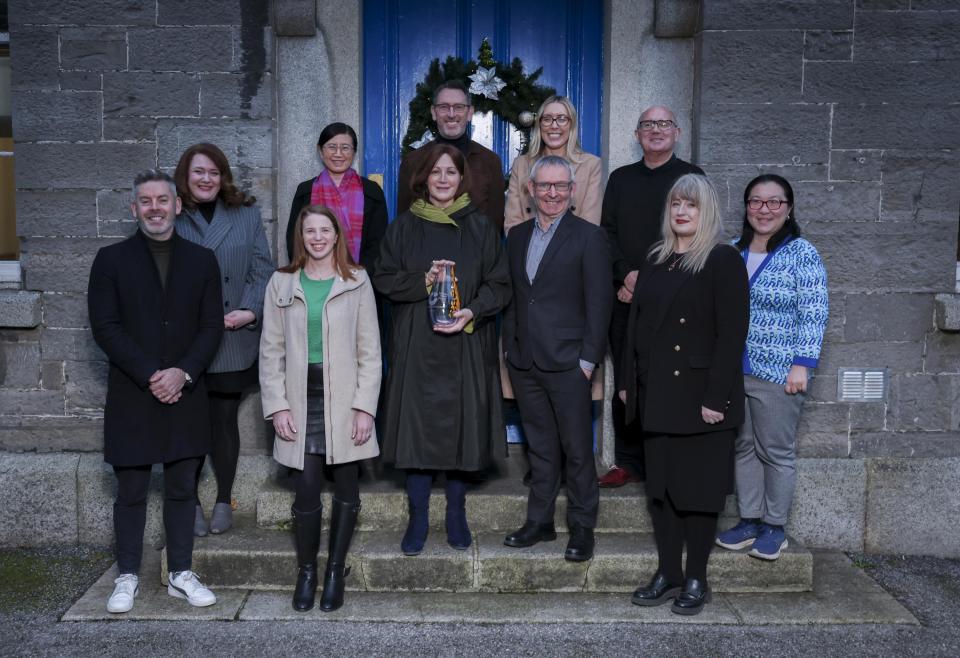
Members of the Athena Swan Self-Assessment Team with DCU's Athena Swan Silver Award
DCU had a successful year engaging with Athena Swan in 2024; attaining the institution’s Athena Swan Silver Award. This award was received in recognition of our commitment to advancing gender equality and creating cultural change within the university. DCU is the joint-third university in Ireland to be awarded ‘Silver’ status.
Our application to be awarded ‘Silver’ status commenced in 2023 and ran for a period of 16 months. The self-assessment process consisted:
- Gathering and analysis of quantitative staff data in relation to recruitment, promotion, uptake of family-leave, uptake of training and development opportunities;
- Gathering and analysis of quantitative student data in relation to registrations, enrolments, degree attainments;
- Staff consultation via pulse surveys in the areas of disability, race equality, and career progression for researchers (Jan - Mar 2023);
- Staff consultation via an all-staff Athena Swan survey, focusing on areas such as career progression and career development, flexible working, family-related leave experiences, dignity and respect, leadership culture (April 2023);
- Staff consultation via staff focus groups on the themes of career progression, experiences of taking family-related leave, and dignity and respect (Oct 2023).
- Action planning and consultation with senior management on the development of the Athena Swan Silver Action Plan 2024 - 2029 (Jan - Apr 2024).
DCU’s Silver Award Action Plan is set to run until 2029, with key priorities including enhancing practices on inclusive leadership, achieving appropriate gender representation across all staff grades, strengthening transparency of career progression pathways, supporting work-life balance, embedding inclusivity in policies and practices, increasing the University’s ability to capture data across all equality grounds, and ensuring a continued safe and respectful working and studying environment for all members of our University community.
Additionally, DCU was awarded another departmental Bronze award in 2024 - School of Law and Government. This brings the total number of departmental awards to nine. DCU aims to have all academic departments attain an award by 2026.
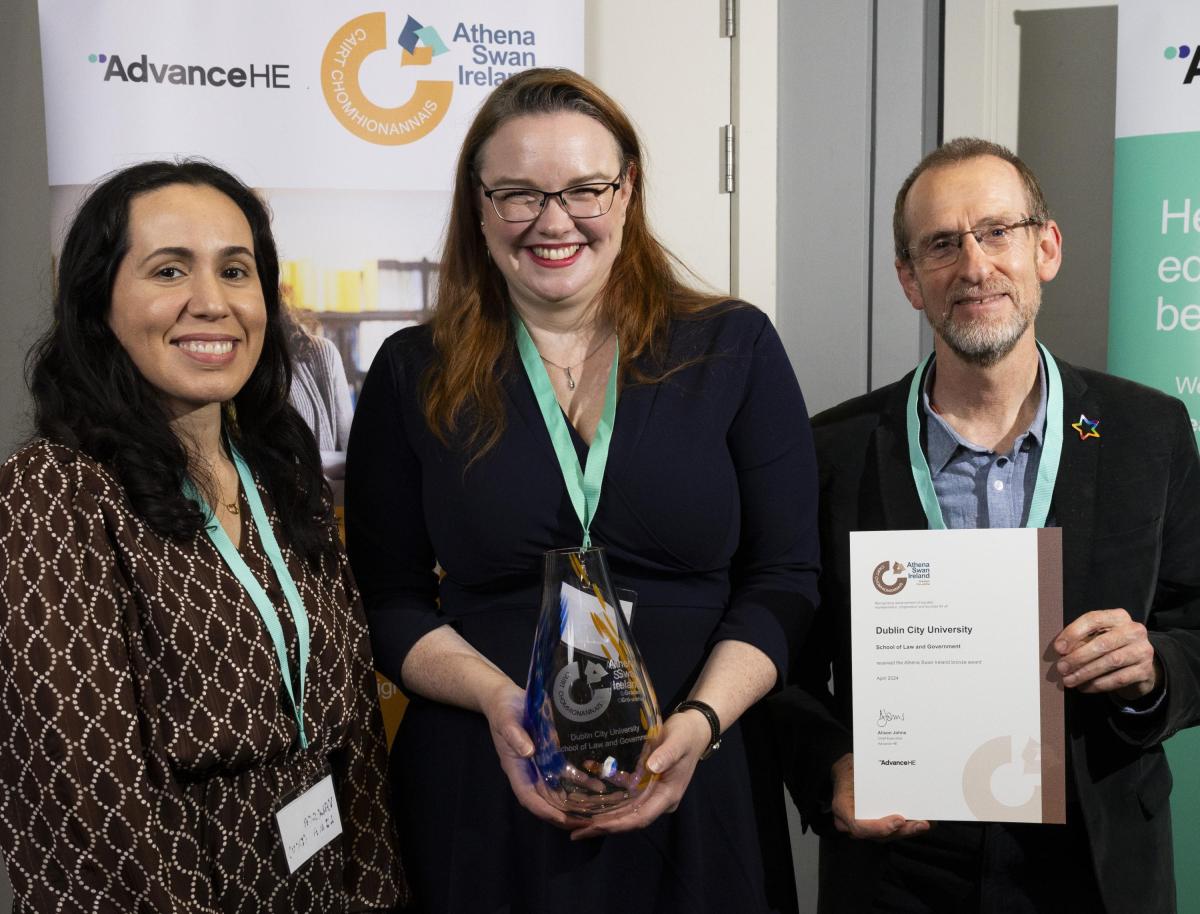
Dr Valesca Lima, Dr Tanya Ní Mhuirthile and Dr Walt Kilroy from DCU School of Law and Government accepting their Athena Swan Bronze Award, November 2024.
Aurora, a leadership development programme for women, was designed to help address the issue of the under-representation of women in senior posts in the higher education sector. Hosted annually by Advance HE, the objective of the programme is to embed a leadership mindset whereby women identify as leaders and seek appropriate opportunities to develop capabilities, skills and networks to support them in their developing careers. In 2024, DCU engaged with the programme to send two cohorts; with 14 women participating from March to July 2024, and a further 13 women commencing the programme in October 2024.
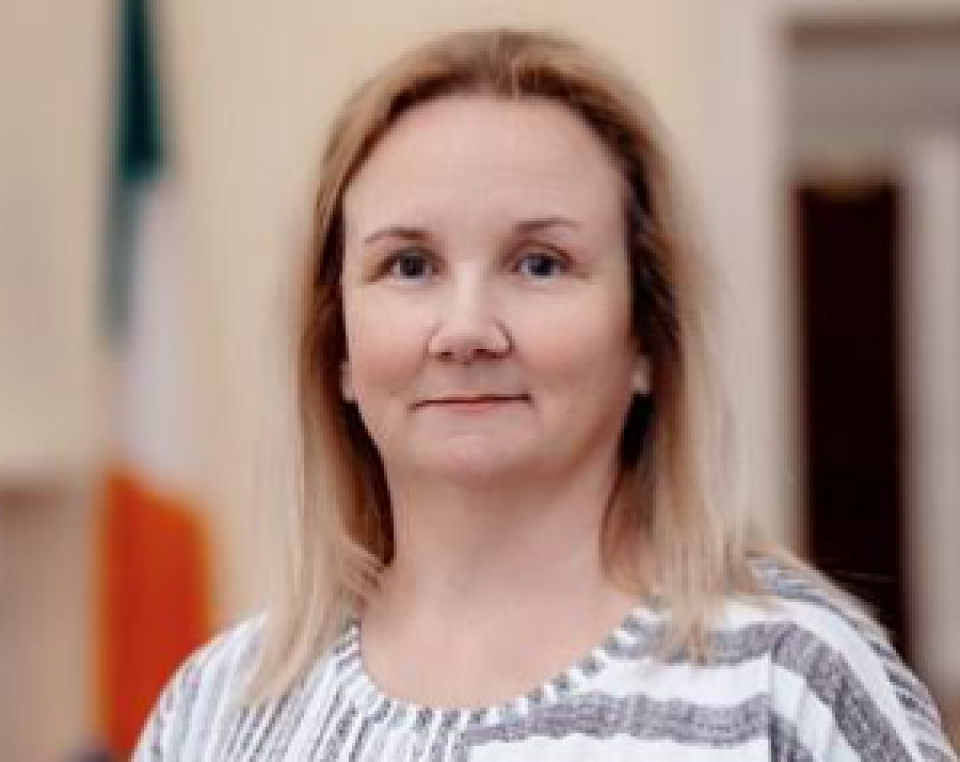
Vikki Doyle, International Mobility C-ordinator
The programme encouraged deep introspection, enabling me to evaluate my strengths and areas for improvement. I discovered new dimensions of my leadership identity, including my ability to inspire and mentor others. This process has redefined my understanding of leadership as a collaborative, value-driven endeavour.
- Vikki Doyle , International Mobility Co-ordinator and Aurora 2024 Participant
In 2024, DCU continued to actively contribute and engage in the Preparing for Academic Advancement (PAA) programme. This sectoral programme, led by University of Limerick, was first launched in 2021 with funding support from HEA’s Gender Equality Enhancement Fund. Specifically designed for female academics at Associate Professor level who are ready and credible challengers for promotion to Professor, it looks to provide structured support and guidance on preparing for promotion. In 2024, four DCU academics applied for the programme, with all four being successful in attaining a place. The 2024 programme ran from June to October, with three key modules held and a series of individual mentoring sessions.
A total of fourteen DCU female academics have now completed the programme since 2021, with 21% promoted to Professor as of December 2024. We will continue to monitor the impact of this programme on participants’ career journeys.
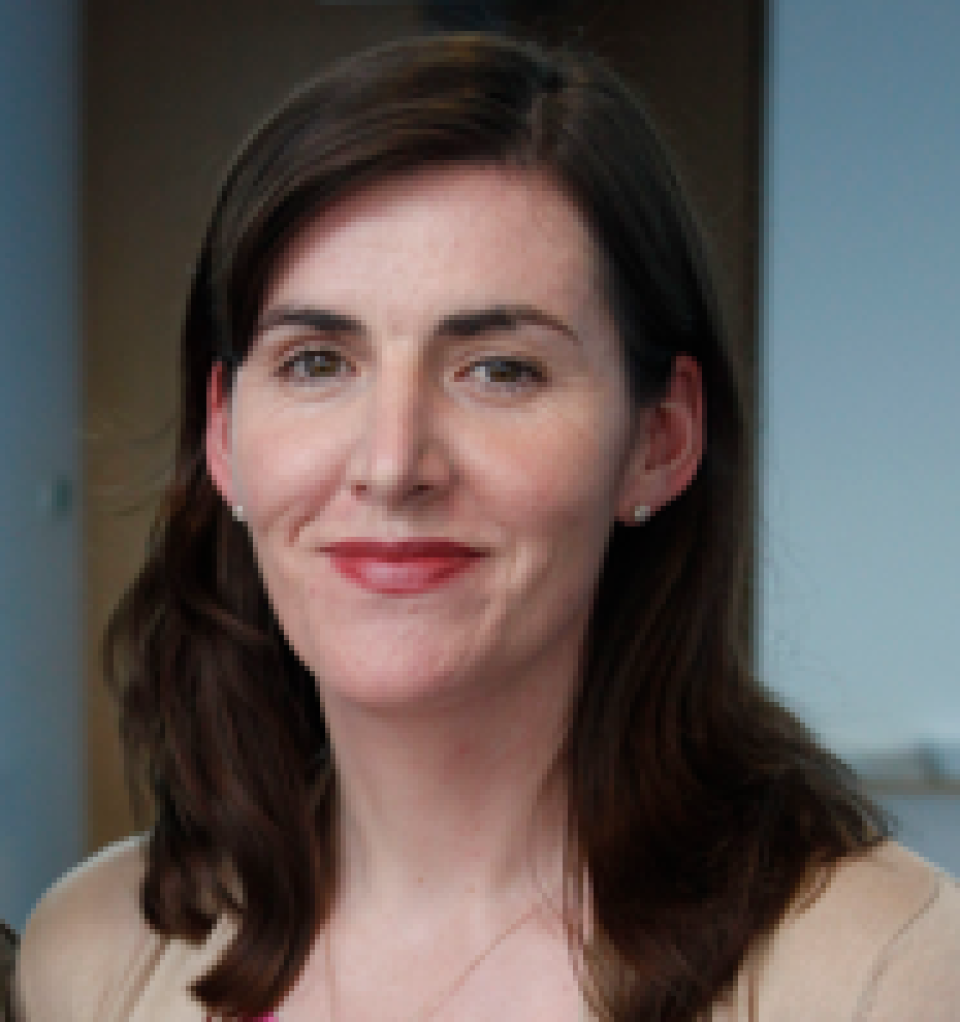
Dr Margaret Heffernan, Associate Professor, DCU Business School
In 2024, I had the privilege of being selected for the Preparing for Academic Advancement (PAA) Programme. It can be challenging as an academic to find time, amidst work and personal commitments, to reflect on career goals and how we work. This programme provided the perfect opportunity for that. The mix of online and in-person sessions allowed the small group to network and build valuable connections. The diversity of participants from various institutions and faculties was particularly good, offering differing (and often similar) perspectives. Another key aspect of the programme was the focus on reflection—considering our values and how we can progress in our careers while staying true to what motivates and anchors us.
As part of the programme, I was paired with a mentor from another institution. This allowed me to discuss career goals, explore new opportunities, and set actionable plans for the future, bringing an added layer of accountability to the programme’s content. Overall, I would highly recommend the PAA programme to anyone looking to take the next step in their career.
- Margaret Heffernan, Associate Professor, DCU Business School and PAA participant 2024
Since the establishment of the Women in Leadership initiative in 2015, there has been continued progress on increasing female representation across all academic grades, particularly focusing on senior grades where underrepresentation of women is persistent. We have seen great strides made in attaining appropriate gender balance at Full Professor level, where female representation rose from 21% (2015) to 40% (2024). The introduction of gender quotas within the process for promotion to Associate Professor in 2017 continues to result in a steady increase in female representation at this level, with 51% of employees now in this position being women.
We witnessed a slight decline in female representation at Professor level in 2024, but there are several actions in our Athena Swan Action Plan 2024 - 2029 which aim to address this underrepresentation.
Female representation at non-academic level (pay scale with maximum point above €70,000) has declined slightly to 50% but gender parity remains. Male representation at non-academic level (Pay scale with maximum point on or below €70,000) currently sits at 31%; with actions to reduce the gender disparity at these grades included in our Athena Swan action plan.
|
Breakdown of academic staff by grade: |
2015 |
2023 |
2024 |
2023-2024 |
||||||||||||
|
Whole Time Equivalent |
Percentage |
Whole Time Equivalent |
Percentage |
Whole Time Equivalent |
Percentage |
Percentage Changes of Females |
||||||||||
|
Male |
Female |
Total |
Male |
Female |
Male |
Female |
Total |
Male |
Female |
Male |
Female |
Total |
Male |
Female |
||
|
Full Professor* |
42.8 |
11 |
53.8 |
79% |
21% |
46.1 |
24 |
70.1 |
66% |
34% |
43.8 |
29.2 |
73 |
60% |
40% |
+6% |
|
Professor** |
14 |
8 |
22 |
64% |
36% |
25 |
15 |
40 |
63% |
38% |
28 |
16 |
44 |
64% |
36% |
-2% |
|
Associate Professor*** |
49 |
31 |
80 |
61% |
39% |
79 |
78.48 |
157.48 |
50% |
50% |
82.85 |
85.47 |
168.32 |
49% |
51% |
+1% |
|
Assistant Professor**** |
111 |
129 |
240 |
46% |
54% |
195.3 |
227.03 |
422.33 |
46% |
54% |
207.90 |
238.41 |
446.31 |
47% |
53% |
-1% |
|
Breakdown of non- academic staff by grade: |
2015 |
2023 |
2024 |
2023-2024 |
||||||||||||
|
Whole Time Equivalent |
Percentage |
Whole Time Equivalent |
Percentage |
Whole Time Equivalent |
Percentage |
Percentage Changes of Females |
||||||||||
|
Male |
Female |
Total |
Male |
Female |
Male |
Female |
Total |
Male |
Female |
Male |
Female |
Total |
Male |
Female |
||
|
Pay scale with maximum point above €70,000 |
25 |
29 |
54 |
47% |
53% |
73 |
88.4 |
161.4 |
45% |
55% |
98.9 |
97.3 |
196.2 |
50% |
50% |
-5% |
|
Pay scale with maximum point on or below €70,000 |
106 |
227 |
333 |
31% |
69% |
159.97 |
314.71 |
474.68 |
34% |
66% |
136 |
306.6 |
442.6 |
31% |
69% |
+3% |
In 2024, we were pleased to present our third Gender Pay Gap (GPG) report, in compliance with the Gender Pay Gap Information Act 2021. The Gender Pay Gap, defined as the difference between the average hourly wage of men and women across a workforce, is an important measure of representation and progression. Rather than reflecting pay inequities or bias, it offers valuable insights into workforce composition and highlights opportunities for systemic enhancements.
Based on snapshot data as of June 30, 2024, which included a total of 2,086 employees, our GPG results demonstrate notable progress compared to 2023. The overall mean gender pay gap has decreased from 8.18% to 5.11%, and the median gender pay gap has reduced from 10.71% to 8.30%. These improvements reflect meaningful strides in advancing gender balance, particularly in higher-paying roles. For example, the proportion of women in the Upper Middle (Quartile 3) and Upper (Quartile 4) earning groups has increased to 52.45% and 53.17%, respectively, building on progress made in previous years.
The increase in the total workforce has likely influenced this progress by providing opportunities for more balanced gender representation across all pay quartiles. While ongoing efforts to create more equitable opportunities across all staff groups may have played a role, other factors could also have contributed. For instance, fluctuations in claim
payment patterns and improvements in data capture processes may have impacted the representation of earnings, particularly for part-time casual staff, further influencing the overall Gender Pay Gap results.
We recognise that addressing the Gender Pay Gap is an ongoing process requiring sustained effort. Initiatives such as the Women in Leadership suite of programmes, and our Athena Swan accreditation have been pivotal in promoting gender balance by supporting the progression and development of women into leadership roles and higher-paying positions. These initiatives aim to create a more equitable environment by addressing structural barriers, fostering professional growth, and ensuring inclusive opportunities for all genders. We remain committed to building on these efforts to achieve sustained improvements in gender representation across all levels of the organisation.
Building on becoming a signatory of the Higher Education Authority (HEA) Anti-Racism Principles for Irish Higher Education Institutions, DCU continued to affirm its commitment to actively combating racism and promoting race equality across the university.
The HEA Anti-Racism Principles and the Race Equality Implementation Plan provide a robust framework for these efforts. They emphasise the importance of embedding anti-racism into the core activities of higher education institutions, including governance, teaching and learning, research, and both the student and staff experience. These principles guide DCU’s mission to identify and address systemic barriers and cultivate a truly inclusive environment.
In June 2024, DCU established the Race Equality Working Group. This diverse group brings together voices from across the university to develop a comprehensive institutional Race Equality Action Plan. The Working Group's key priorities include engaging with staff and students, reviewing existing policies, promoting awareness through training programs, and monitoring progress. Their work aligns with both the HEA Anti-Racism Principles and DCU's Athena Swan commitments, ensuring race equality becomes an integral part of the university's culture by placing lived experience at the heart of institutional change.
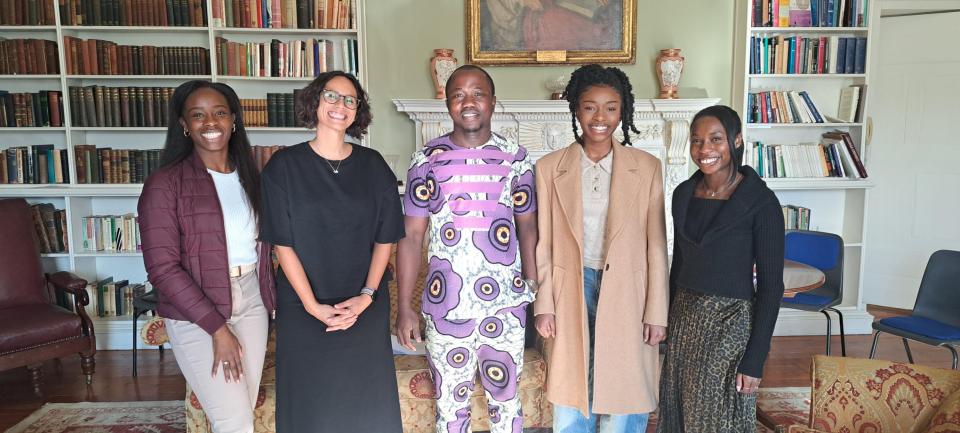
Bridging Cultures Through Dance, Black History Month, October 2024
October marked a vibrant celebration of Black History Month at DCU. The university hosted a series of events, including a fireside chat exploring Black experiences in Ireland, an Afro Dance workshop, and a curated book exhibition, to honour the contributions of Black communities and amplify voices that have historically been underrepresented. These events fostered important conversations around race, identity, and inclusion, further enriching the university's commitment to diversity.
In 2023, a review of our current Code of Practice for Employment of People with Disabilities was carried out, with recommendations to develop a more robust and comprehensive policy to support disabled employees. In 2024, DCU People commenced the process of developing a new Disability Policy for Employees. Initial draft of the policy was made in 2024, with valuable input from a Disability Staff Advisory Group. Further consultation is planned for early 2025, with the aim to launch the policy in Q2 2025.
As the policy is in development, DCU People created a useful Frequently Asked Questions (FAQ) regarding accessing disability supports (mainly reasonable accommodations) to ensure disabled staff and line managers are aware of entitlements and processes.
The active implementation of the revised Dignity and Respect at Work and Study Policy, launched in 2023, was continued in 2024. This is a flagship policy for the University and all staff have a responsibility to ensure they are familiar with the policy and their own rights and responsibilities. The Policy is part of a wider Dignity and Respect Toolkit that has been developed and put in place to support all staff to understand what behaviours are expected of them as well as what to do should they wish to report any issues or inappropriate behaviour.
Throughout 2024, a series of bespoke Dignity and Respect sessions were carried out with specific departments and areas within DCU. Our work on Dignity and Respect was also at the forefront of our Athena Swan Silver submission and associated action plan, and is a key priority area for the period 2024 - 2029.
All staff but in particular those in roles of responsibility are asked to consider hosting a specific Dignity and Respect information session within their local team / School / Department. This can be arranged by contacting edi@dcu.ie.
In line with the University's commitment to ending sexual violence and harassment, DCU has an ongoing action plan to enhance the experiences of staff and students, and to ensure a safe and respectful working and studying environment on our campuses. A new implementation plan for the academic year 2024/25 was created in 2024, and focuses on: enhancing policies and procedures; ensuring robust institutional reporting, ensuring effective campaigns and ongoing communications, and education and training for staff and students.
Similar to the Dignity and Respect at Work and Study Policy rollout, awareness raising of the new Seuxal Misconduct Policy (launched in 2023) continued in 2024; with bespoke sessions being held for departments and units. This will continue into 2025, and all staff but in particular those in roles of responsibility are asked to consider hosting a specific Sexual Misconduct information session within their local team / School / Department. This can be arranged by contacting edi@dcu.ie.
The 16 Days of Activism against Gender-Based Violence is an annual international campaign calling on everyone to help the elimination of gender-based violence against women and girls. It is also a call to governments and institutions to finance different prevention strategies to stop violence from occurring in the first place.
Starting on Monday 25 November, the International Day for the Elimination of Violence against Women, until Tuesday 10 December, Human Rights Day, 16 universities across the country, including DCU, showed their support through a national social media campaign. We posted a daily call to end gender-based violence on our Care and Connect Instagram and turned the DCU logo on Glasnevin and St Patrick's campuses orange.
The colour orange is used by the UN to unify all activities taking place globally and encourage people to use different ways to bring attention to this important campaign by decorating buildings or offices orange, wearing the colour orange or turning your social media avatars orange throughout the 16 days.
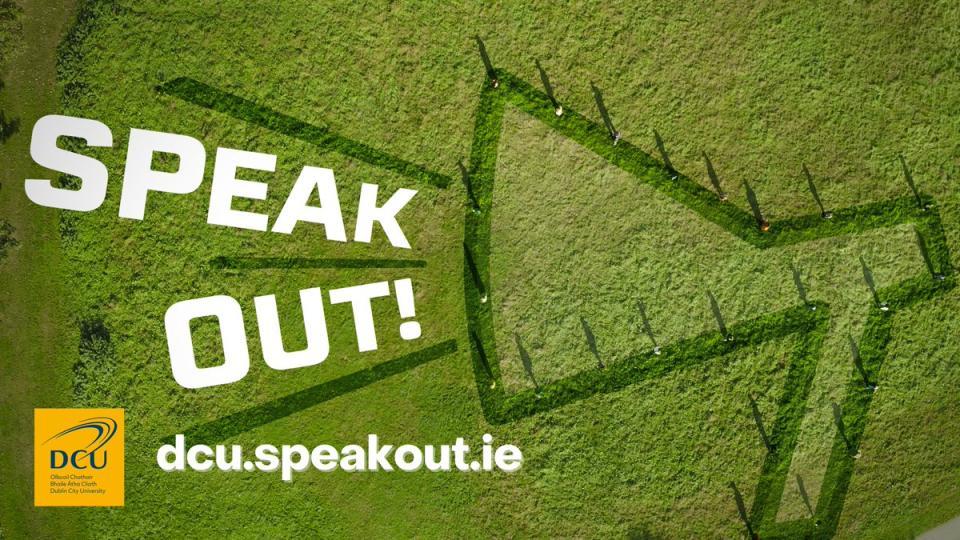
DCU Speak Out Tool
The DCU Speak Out Tool allows any staff, student or visitor at DCU to anonymously disclose incidents of unacceptable behaviour such as bullying, harassment, and sexual misconduct. As Speak Out is completely anonymous, the University will have no way to identify or make contact with any individual who chooses to submit a report. While the tool is anonymous, it will direct you to appropriate supports and provide you with information on what formal reporting procedures are available.
The Public Sector Equality and Human Rights Duty is set out in Section 42 of the Irish Human Rights and Equality Commission Act 2014. Under the Duty all public bodies in Ireland have a legal obligation to promote equality, prevent discrimination and protect the human rights of their employees, their customers, their service users and anyone else affected by their service.
As part of ensuring DCU’s compliance with the Duty, the University identified nine operational areas for assessment:
- Teaching and learning
- Employment
- Research and innovation
- Access and community outreach
- Placement
- Support for student wellbeing
- Provision of student accommodation
- Campus Residences
- DCU Students
As part of the annual monitoring and reporting process, representatives from each of these areas were asked to review their operations and to prepare an individual report outlining actions undertaken to ensure compliance with the legislation. Upon receiving these reports, the Office of the Chief Operations Officer found DCU to be in compliance with the Duty and reported the same to DCU’s Equality, Diversity and Inclusion Committee (sub-committee of Governing Authority).
During 2024 the EDI Unit delivered 28 training sessions to 513 attendees. The majority of sessions were targeted at all university staff with additional specialised training offered to DCU People Partners and Line Managers. Information sessions and workshops were delivered to individual departments on EDI-related policies, including dignity and respect and sexual misconduct. Most sessions were delivered online to maximise attendance across all DCU campuses and to facilitate DCU’s flexible working arrangements.
Attendance was particularly strong for Intercultural Awareness Training, Autism Awareness Training, Trans and Non -Binary 101 Workshop and Deaf Awareness Training.
Engagement with these opportunities was extremely positive with staff reporting the training topics were relevant to their role, their awareness of a subject improved, their confidence and comfort in talking about a topic improved and they now have an enhanced awareness of the support available within DCU.
We would like to thank all staff who attended the sessions and engaged with these important topics. We would also like to thank all of our facilitators who brought their expertise and knowledge to the sessions and created safe spaces for discussion.
|
Training Topics delivered during 2024 |
|
|
All Staff |
|
|
Intercultural Awareness Training |
Deaf Awareness Training |
|
Autism Awareness Training |
Anti-Racism Training for All Staff |
|
IDAHOBIT: Trans & Non-Binary 101 Workshop w/ ShoutOut |
Supporting Students Registered with Disability & Learning Support Service |
|
Inclusive Technology Workshop |
Disability and Learning Support Services (DLSS) Staff Awareness Training |
|
Digital Accessibility Awareness Workshop |
Irish Sign Language Classes |
|
Line Managers Training |
|
|
Supporting Autistic Staff - Training for Line Managers |
Menopause Awareness Training for Managers |
The Age-Friendly University (AFU) activities at DCU exemplify equality, diversity, and inclusion (EDI) through a range of innovative and impactful initiatives that promote accessibility, intergenerational collaboration, and a commitment to lifelong learning. Several activities took place across the year, many of which embody EDI principles:
- Educational Opportunities for All Ages: DCU’s AFU offers over 230 undergraduate and postgraduate modules for older adults to audit, as well as tailored learning programs on subjects like genealogy, art, and politics. This ensures that education remains accessible to all, irrespective of age.
- Addressing Barriers to Education: Programmes are designed to accommodate the varied needs of older learners, from early school leavers to those pursuing advanced degrees. This inclusive approach recognises diverse educational backgrounds and life experiences.
- Bridging the Digital Divide: Through training on social media and specific applications on laptops and mobile phones to foster digital literacy, DCU actively reduces barriers to technology, making online learning opportunities accessible to older adults.
- Intergenerational Learning and Exchange: Initiatives such as the Transition Year Awards and Intergenerational Games Nights encourage shared experiences between younger students and older adults. These programs break down stereotypes, foster mutual respect, and enrich learning environments.
- Cross-Generational Insights: By integrating older learners into mainstream courses, DCU promotes knowledge-sharing across age groups, helping younger students understand the richness and complexity of ageing while older students bring diverse perspectives to the classroom.
- Cultural and Artistic Inclusion: The “Ageless Expression” exhibition and other artistic initiatives provide a platform for older adults to express their creativity. The diverse range of artistic works showcases participants’ talents from varied cultural and personal backgrounds.
- Socioeconomic Diversity: Non-degree learning options and tailored programs ensure that participants from different socioeconomic and educational backgrounds can engage with the university, widening the reach of its inclusive ethos.
- Advocacy and Representation: Programs like the Election Advocacy Workshop empower older adults to participate in policy discussions and advocate for their rights. This reflects the principle of inclusivity in civic engagement and underscores the value of all voices in shaping societal decisions.
- Holistic Support Systems: Projects like Culture on Prescription (COPE) address mental health by fostering social interaction and intellectual engagement. These efforts directly combat isolation and loneliness, promoting equality in health and well-being.
- Age-Friendly Health Programmes: The AFU integrates health-focused activities into its offerings, ensuring older adults can access resources that enhance physical, emotional, and mental health.
Lunch and Learn (Tuesday 5th March)
The EDI Unit, in partnership with DCU Cultural Arts Office, celebrated this year's International Women's Day theme, Inspire Inclusion, by hosting a Women on Walls Lunch and Learn. Colleagues joined us for an expert talk on Accenture's Women on Walls at DCU led by Marcella Bannon, DCU Cultural Arts Officer.
This event celebrated DCU's exhibition of a group of pioneering and extraordinary women; mathematician Kathleen (Kay) McNulty; biochemist Dr Marie Maynard Daly; engineer Beatrice Alice Hicks; X-ray crystallographer Dame Kathleen Lonsdale and Nasa scientist Katherine Johnson.
Lunch with TED Watch Party (Wednesday 6th and Thursday 7th March)
The EDI Unit hosted two watch parties for all DCU staff to come and enjoy some inspiring TEDTalks that remind us why International Women's Day is such an important occasion for everyone.
This year's talks were:
- Dame Stephanie Shirley - Why do ambitious women have flat heads?
- Soraya Chemaly - The power of women's anger
To mark IDAHOBIT (International Day Against Homophobia, Biphobia and Transphobia), the EDI Unit in collaboration with ShoutOut hosted a session for colleagues - Trans and Non-Binary 101. Topics covered in the session included:
- Understanding how terms like sexual orientation, gender identity, and gender expression relate to each other, and how identity can be fluid
- Trans, non-binary, and intersex identities: helpful terminology, what it’s like to be trans, non-binary or intersex in Ireland today
- Pronouns and gendered terms: why they matter, how we can be more inclusive through language
- Organisational change to support trans and non-binary colleagues
- Small steps we can all take to support our trans and non-binary friends, colleagues, and students
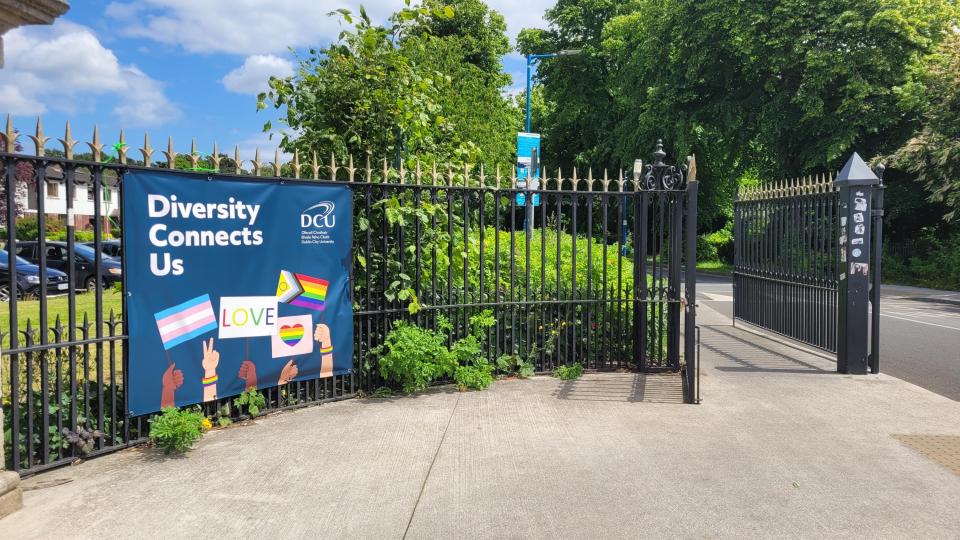
Diversity Connects Us
Pride+, DCU's dedicated staff network for members of the LGBTQIA+ community and their allies, held their first successful programme of events celebrating Pride throughout June.
Banners and digital messages celebrating Pride month were displayed and the Trans and Pride flags were flown in support on each campus. DCU's social media avatars showed Pride+'s mission of Diversity Connects Us and DCU President Prof Dáire Keogh welcomed the launch of Pride+ in a President's message on the DCU website.
Events included the inaugural DCU Pride in Teaching & Research where LGBTQ+ educators, researchers and allies came together to share insight of their teaching and research practices. Topics presented included heteronormativity, asexual identity, LGBTQIA+ young persons' experiences, and many more. Rounding off Pride month, staff were officially represented for the first time at the parade where they joined DCU Students' Union and friends and family to march in the 50th Dublin Pride Parade.
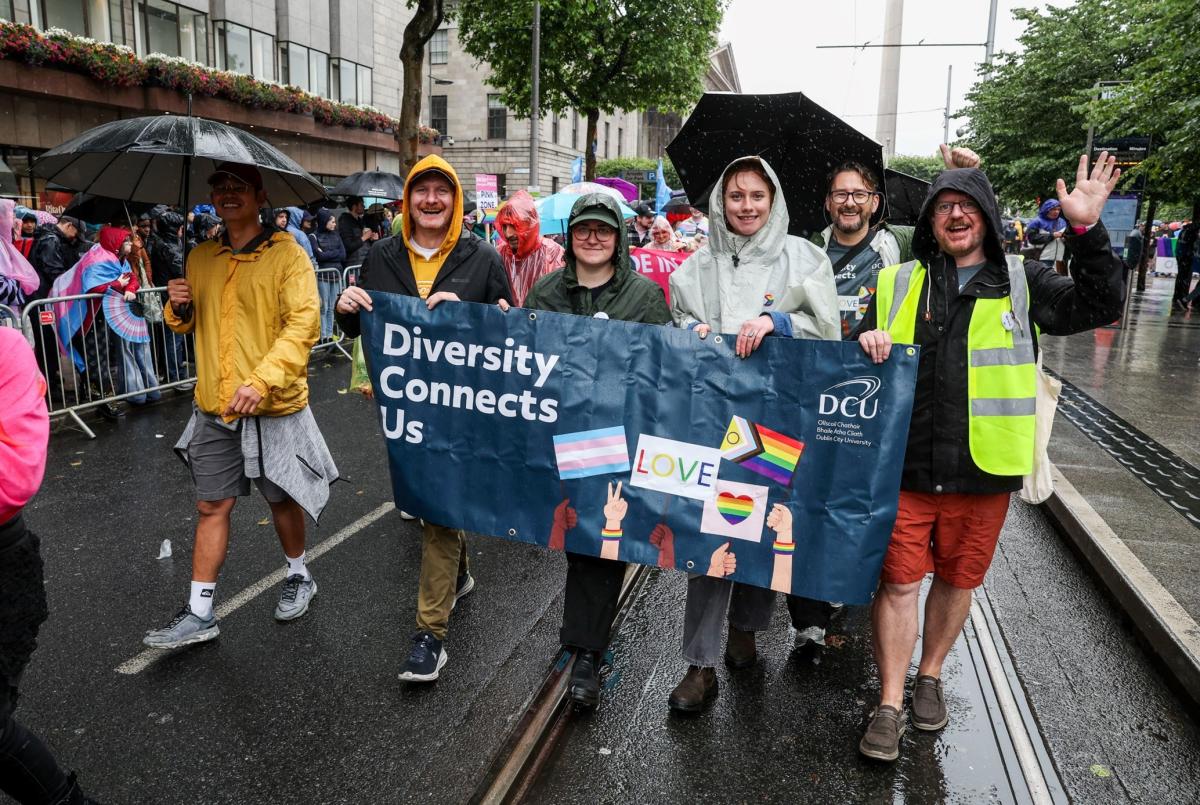
To mark Black History Month, the DCU People EDI Unit, Student Support & Development, Institute of Education and DCU Students' Union hosted a range of arts, cultural, and educational events throughout October 2024 on both the Glasnevin and St. Patrick's campuses.
Book Exhibition
The Institute of Education (IoE) collaborated with the HR EDI Unit and the Race Equality Working Group to host a book exhibition showcasing literature that highlights the contributions of authors and scholars on this important topic.
Anti-Racism Training
This workshop empowered participants with knowledge and skills to identify and correct previously unrecognised patterns which could negatively impact inclusion efforts.
With shared language and a clearer understanding of how various dimensions of racism are producing unjust and inequitable outcomes for underrepresented groups, DCU staff will be better equipped to foster an anti-racist and inclusive experience within their workplace.
Bridging Cultures Through Dance
DCU SS&D welcomed Southside Moves for a vibrant and welcoming haven to engage in Afro Dance.
Through the mode of dance and movement, this workshop class is where the vibrant tapestry of African dance culture intertwines with other unique styles. The aim was to share knowledge, foster unity, and celebrate diversity in the world of dance.
Gorma Gig
For Black History Month, the DCU Students’ Union celebrated black voices and black excellence through the means of the Gorma Gig. The term gorma, being the word for person of colour as Gaeilge.
Fireside Chat Event
Staff and students were invited to the fireside chat "Unheard Narratives – Exploring Black People's Experiences" to delve into personal journeys and the broader experiences of Black people navigating life in Ireland, exploring the unique challenges, triumphs, and strategies for thriving in Irish society. The panel featured Peace Chukwurah, Vincent Tawiah, Beyonce Tommina Tom Irehovbude and Gertrude Rufai from our own DCU community.
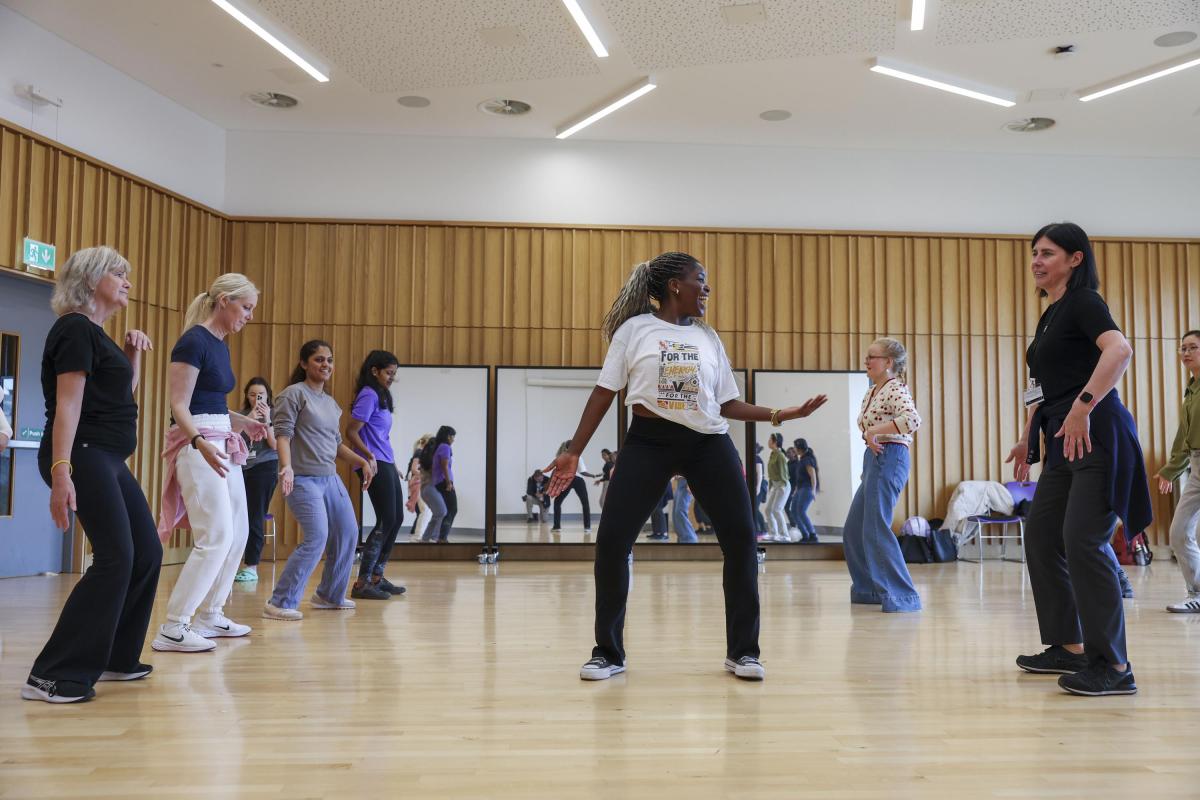
International Men's Day 2024 celebrates the positive value men bring to the world, their families and communities and this year we celebrated the influence and contribution of positive male role models.
The EDI Unit asked DCU staff to share stories and memories of the men who they look up to, why they inspired them, how they had impacted them and brought joy. Stories were shared on the DCU People EDI webpage.
